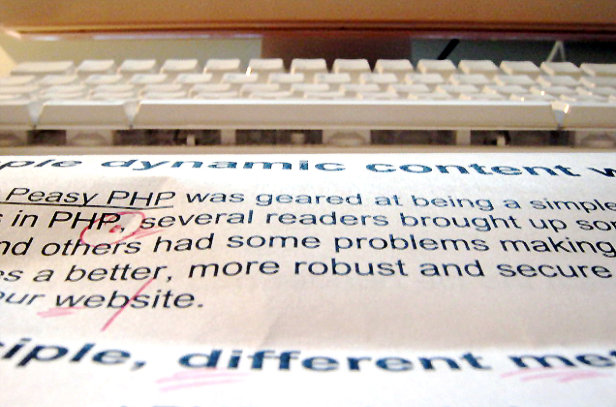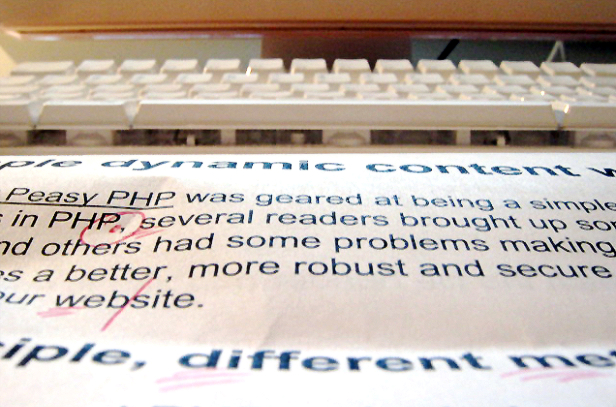 Punctuation can be the greatest impediment to getting nations to see eye-to-eye on any issue.Jennie Faber via Flickr
Punctuation can be the greatest impediment to getting nations to see eye-to-eye on any issue.Jennie Faber via Flickr
It was only a comma, albeit a hotly disputed one. For me, the single punctuation mark represents a major reason why the world may fail to get to grips with global warming in time, and why a meeting this week may provide the best chance of a breakthrough.
The comma sat there, in all its splendor, deep in a UN negotiating text, penned in square brackets to show it was a matter of dispute. For days top diplomatic talent from the world’s capitals argued about whether it should remain, or be removed, without getting anywhere near agreement. And I was trying, as a reporter, to make sense of it.
Eventually, I had enough. My wife was with me at the negotiations, in New York, and we decided it was time for a break. I had to give a lecture at the Massachusetts Institute of Technology, if I remember rightly, about a book I had written, and so we hired a car and set off slowly through New England.
It was just after Labor Day; the weather was lovely, prices were down, and the pound was reasonably strong. We headed for Cape Cod, stopping off on the way in Mystic and Stonington in Connecticut. We rode on scooters around Martha’s Vineyard, went birding at dawn on Nantucket, and enjoyed arguing with the actors playing the pilgrims at the Plymouth Plantation. After ten glorious days we returned, much happier, to Manhattan — only to find the bracketed comma still the center of high-level international debate.
I remember that Ronald Reagan’s campaign for the presidency was getting into full swing, so it must have been 1980. I know that the presence or absence of the comma changed the meaning of the sentence it adorned, but cannot begin to remember what that sentence was about. The talks were the so-called “global negotiations,” now long forgotten, on establishing a “new economic order” between rich and poor countries. Predictably, the talks ran — if such a word can be used to describe their snail’s pace — into the sand.
Little, alas, has changed in the three decades since. I have, I admit, yet to spot a bracketed comma in the texts of coming out of the various international climate negotiations, but their pace seems no faster. Week after week alarming evidence piles up about the impact that global warming is already having around the world. But to say that progress is glacial is to do an injustice to the rapidity of what is happening to the world’s rivers of ice.
Early this month, ten days of negotiations in Bonn made almost no progress, even though the scientists have convincingly shown that time is getting desperately short if a new agreement is to be negotiated in Copenhagen in December. The next round of climate talks, not much more than a month away now, is not expected to get much further.
The negotiating conferences are strange events. Enclosed in a tight bubble in almost identical conference halls around the globe, they quickly lose contact with the world outside their air-conditioned anonymity. High passions arise over apparantly arcane phrases. Days pass in fruitless stalemate, and success or failure depends on whether last minute sessions headed by ministers, who have flown at the last minute, achieve breakthrough in punishing all-night sessions — or whether the need to vacate the center to make way for the next event (in one case an underwear convention) forecloses on saving the world.
All the same, there have been stunning successes when the international community gathers to confront a shared threat. Perhaps the greatest was at the other end of the 1980s, when the world managed, just, to agree on the 1987 Montreal Protocol to protect the ozone layer. The wording of the agreed treaty was so sensitive that the organizers prohibited its translation into the other official UN languages, like French and Spanish, for fear that the resulting minute changes in meaning would wreck the consensus. But it led to the world phasing out ozone depleting services far faster than anyone thought possible.
The breakthrough happened because the negotiations had two vital elements. One was a determined headbanger, Mostafa Tolba — at that time the executive director of the United Nations Environment Programme — who thought nothing of cooping up the key negotiators for talks in an airless room, and refusing to let them out until they has reached agreement. The other was the drive for success by a powerful nation, in this case the United States under Reagan (though it is thought that this was partly because the old boy did not know what was going on). Most of the other successes have had similar vital ingredients.
And there lies the importance of this week’s meeting in Washington. Barack Obama invited the world’s key nations — responsible for 80 percent of greenhouse gas emissions — to try to inject enegy into the global climate negotiations and prepare for a special climate summit in July, to be held in concert with the G8 meeting.
The U.S. is back in the lead on climate, and the meeting that happened on Monday and Tuesday might just provide the top-level impetus needed to get things going. If it doesn’t, we may end up less concerned with the commas than with a full stop. Period.



